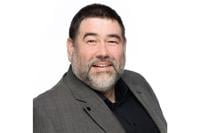As parents to four boys under eight years of age, things are always busy for Phil and Brodie Mackenzie.
Co-founders of , the Burlington couple offers health and nutrition advice to help others live their best lives.Â
But the secret to their success has now come from taping their mouths shut every night before they go to bed.
It was a trend touted by celebrities and influencers last fall, with many posing in their pyjamas with tape over their mouths.
For Phil Mackenzie, the act all started in desperation for a restful night’s sleep.
At first, he was like many parents, who believed feeling sleep-deprived just came with the role.
âThat’s a bit of a fallacy,â Mackenzie said.
Because it didn’t matter if he went to sleep at 9 p.m., he wasn’t waking the next day feeling rested.
âI was tracking my sleep, and no matter what we did â we did everything â bought all the supplements, a cooling mattress, and our restorative sleep wouldn’t budge, and that’s really the most crucial part of sleep.â
He also tried cold plunging and hot saunas to see if that worked. It didn’t.
Restful sleep is important
According to the Cleveland Clinic, if you’re not getting enough sleep, or the quality isn’t good, your body and brain won’t work as it should.
Adults need seven to nine hours of sleep, and Mackenzie’s sleep tracker showed he was getting around two hours of deep sleep a night.
âWhen you fall asleep, you typically enter non-rapid-eye-movement stage 1 and then cycle between stages 2 and 3,â the . âAfter that, you go into rapid eye movement (REM) sleep and start dreaming.â
After the first REM cycle, you cycle back into stage 1 or 2 light sleeping, and repeat the process back into heavy sleep.
It’s during stage 3 and REM sleep the body is able to recover and repair itself, also building its immune system.
Mouth breathing
In his search for a better sleep, Mackenzie stumbled upon James Nestor’s book, â,â which then led him to expert and his podcasts about nasal breathing.
As a former Team Canada rugby player, with a deviated septum in his nose since 18, Mackenzie has been more of a mouth breather.
According to , mouth breathing is a primary cause of snoring, which can âcause disruptions in your sleep and keep you from being fully rested.â
Snoring can also be a symptom of sleep apnea, a condition where you stop breathing for a short time, which can be dangerous to your health.
âI think people don’t realize is they may have mild, undiagnosed sleep apnea. Clearly, I was and my wife was.â
In children, mouth breathing even has potential to lead to craniofacial development changes, .
By blocking your mouth, and focusing on nasal breathing, nitrous oxide is created — which increases blood flow, lowers blood pressure and improves brain function, said.
Armed with this type of information, Mackenzie grabbed some tape, and sealed his lips for the night.
âMy wife thought the mouth taping was crazy and psychotic, but I tried it, and for the next two days, my restorative sleep went up to four hours (a night). Then she said she had to give it a try.
âThat’s when we came preachers of the mouth-taping ways,â he said. âNow, my restorative sleep can be over five hours in the night. That restorative sleep is so important. I never knew mouth breathing was a problem.â
They even branded their own version of tape 10 months ago, called , with a box of 30 stickers selling for $29.99.
So far, Mackenzie said the company has earned more than $1 million in sales within its first 10 months.
A learning curve
At first, restricting breathing to your nose can be uncomfortable â especially in the wintertime or during allergy season, when your nasal cavity may be constricted.
âWhen I first tried it, at 4 a.m. I woke up and at the time it was a big piece of tape. I had to rip it off and take a big breath,â MacKenzie said.
But now that he does it every night, his nasal breathing comes easy to him, and he can also run or work out at a decent intensity solely breathing through his nose.
A few customers with CPAP sleep apnea machines have also expressed success using mouth tape â although Mackenzie suggests speaking with a health-care provider before trying mouth tape.
Myth or medically sound advice?
But not everyone agrees with the concept that mouth taping can improve your quality of sleep.
Brian Rotenberg, an ear, nose and throat doctor and professor of surgery at the Schulich School of Medicine and Dentistry at Western University, said that there is currently little scientific evidence connecting mode of breathing with quality of sleep.Â
According to the , Rotenberg kept hearing people ask him for mouth-taping advice, that he planned on conducting a meta analysis on already published studies on sleep, nasal breathing and mouth taping.Â
âWeâre looking at the published data to see âis there any benefit?’ â Rotenberg said in a Toronto Star story. âIs there any risk? What are the side effects? Are there any complications?â
Rotenberg told Metroland Media the study is almost complete, and public results should be available by the end of April or May.
A “Dragons’ Den” potential?
While the original goal of was to help thousands of other people sleep better, the Mackenzies are now unsure where the future will lead, but Phil Mackenzie hopes it will soon be available in retail stores.
When asked if a “Dragons’ Den” appearance may be on the horizon, he didn’t rule it out.
âI mean, maybe we will. I used to do commentary for the CBC for the Rugby 7s,â he said. âIt is a legit business now that’s really been spawned out of a passion, and we’re trying to figure out how we grow. (“Dragons’ Den”) would be a great avenue.â
â with files from Michele Henry
Error! Sorry, there was an error processing your request.
There was a problem with the recaptcha. Please try again.
You may unsubscribe at any time. By signing up, you agree to our and . This site is protected by reCAPTCHA and the Google and apply.
Want more of the latest from us? Sign up for more at our newsletter page.






















To join the conversation set a first and last name in your user profile.
Sign in or register for free to join the Conversation